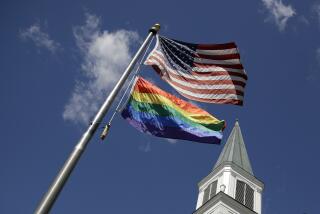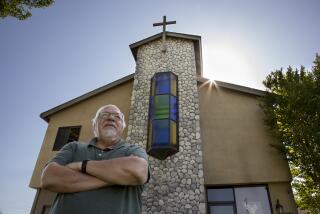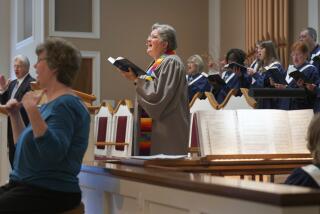Episcopal split hits new level
- Share via
Hundreds of conservative Episcopal congregations in North America, rejecting liberal biblical views of others in the denomination, formed a breakaway church Wednesday that threatened to further divide a global Anglican body already torn by the ordination of an openly gay bishop.
Leaders of the new Anglican Church in North America said they took the extraordinary step to unify congregations and dioceses that had fled the American Episcopal Church and the Anglican Church of Canada over issues of Scripture.
The 700 renegade churches, mostly from the U.S., had already expressed their displeasure by placing themselves under the jurisdiction of Anglican leaders in vast, self-governing foreign provinces.
The festering disputes have prompted numerous lawsuits over church property, as well as spirited -- and prayerful -- debate over the role of gays and lesbians in church life.
Leaders of the churches and splinter groups, saying they represent 100,000 Christians, adopted a provisional constitution Wednesday to govern their new province. They acted at the behest of conservative global Anglican leaders who, during a gathering in Jerusalem last summer, called for the creation of a new independent North American province.
To gain official recognition, the new province must still get approval from two-thirds of the 38 provincial Anglican leaders who represent 77 million Christians worldwide. If approved, it would be the first such province based on theology, not geography, a dramatic departure from Anglican policy.
“This is a reformational movement,” said the Rev. Peter Frank, a spokesman for the Common Cause Partnership, which is spearheading the effort. “We believe that Anglicanism is a beautiful thing. Here in America it got on a track that was taking it farther and farther away from its core beliefs. We’re attempting to return to that.”
Leaders of the 2.1-million-member Episcopal Church lamented the loss but were uncertain about its effect on existing church bodies.
“We will not predict what will or will not come out of this meeting but simply continue to be clear that the Episcopal Church, along with the Anglican Church of Canada and La Iglesia Anglicana de Mexico, comprise the official, recognized presence of the Anglican Communion in North America,” the Rev. Charles Robertson, advisor to the Episcopal Church’s presiding bishop, said in a statement.
“And we reiterate what has been true of Anglicanism for centuries -- that there is room within the Episcopal Church for people with different views, and we regret that some have felt the need to depart from the diversity of our common life in Christ.”
The Rev. Ian Douglas of the Episcopal Divinity School in Cambridge, Mass., predicted the move would have limited effect. “I do not think Wednesday’s event is as big a deal as the organizers think it is,” Douglas said.
He added that “while claiming more conservative tradition on human sexuality and biblical interpretation, their approach is radical and contrary to church polity.”
Four Episcopal dioceses -- in Pittsburgh; Fort Worth, Texas; Quincy, Ill.; and California’s San Joaquin Valley -- are among the religious bodies spearheading the creation of the province.
The dioceses -- and individual parishes -- had already taken steps to distance themselves from the Episcopal Church in recent years. Some parishes, including in Southern California, declared that they had placed themselves under the jurisdiction of conservative bishops overseas.
Some dioceses announced that they had aligned themselves with the Argentina-based Anglican Church of the Southern Cone of America. That alignment would no longer be necessary if the churches created their own province.
It was unclear whether the Anglican Communion or its leader, Archbishop of Canterbury Rowan Williams, would agree to such a step.
The action comes almost a year after the Diocese of San Joaquin, based in Fresno, voted to become the first diocese in the nation to secede from the Episcopal Church.
It also comes five years after the Episcopal Church consecrated its first openly gay bishop, V. Gene Robinson of New Hampshire. Although some of the conservative churches split with the Episcopal Church before Robinson was installed in 2003, most cite the event as the catalyst that drove conservatives away.
The new province, they think, will provide a necessary alternative.
“We support this constitution as it reflects the very qualities that all of us . . . have hoped for in the new Anglican province -- biblically grounded, Christ-centered, mission-driven, outwardly focused, committed to evangelism and discipleship, and proudly Anglican,” said Bishop Martyn Minns of the group Convocation of Anglicans in North America and a key player in creating the province.
The differences go beyond the role of gays and lesbians in church life. San Joaquin, for instance, is one of just three of the church’s 110 dioceses that do not ordain women.
On the issue of gay rights, the diocese’s bishop has said he views homosexuality as contrary to the Bible’s teachings.
Conversely, California’s six leading Episcopal bishops this summer announced their opposition to Proposition 8, the measure banning gay marriage in the state.
--
Manya A. Brachear of the Chicago Tribune contributed to this report.
More to Read
Sign up for Essential California
The most important California stories and recommendations in your inbox every morning.
You may occasionally receive promotional content from the Los Angeles Times.













